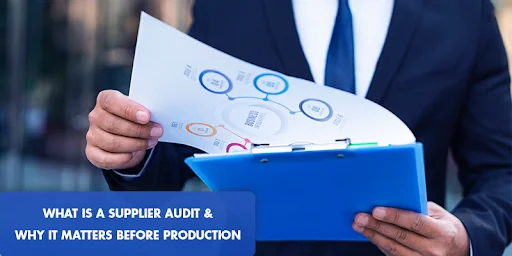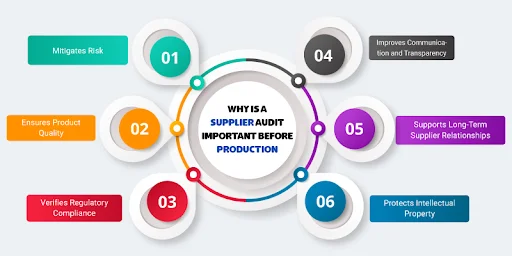What Is a Supplier Audit? Why It’s Crucial Before Starting Production
As companies expand their supply chains and begin sourcing materials or products from third-party manufacturers, one essential step is often underestimated: the supplier audit.
Regardless of whether production is happening locally or abroad, it’s critical to verify that your supplier meets the standards for quality, compliance, and reliability.
A well-executed supplier audit helps uncover potential risks before they become costly problems, ensuring your production runs smoothly and your brand remains protected.
In this blog, we’ll dive into what a supplier audit involves and why it’s a crucial step before any manufacturing begins.

What Is a Supplier Audit?
A supplier audit is a systematic evaluation of a supplier’s operations, processes, and compliance with contractual, regulatory, and quality standards. It typically involves on-site visits or remote assessments conducted by internal teams or third-party auditors. The goal is to ensure the supplier can meet your production requirements consistently and ethically.
These audits assess factors such as:
- Manufacturing capabilities and capacity
- Quality control systems
- Compliance with industry regulations and certifications
- Workplace conditions and labor practices
- Environmental and sustainability practices
- Financial stability and operational risks
Why Is a Supplier Audit Important Before Production?

A supplier audit is crucial before production begins because it verifies that the supplier can meet your quality, compliance, and capacity requirements. By conducting an audit early, businesses reduce operational risks, avoid costly delays, and ensure a smoother manufacturing process from the very first day.
1. Mitigates Risk
Before investing time and capital into production, an audit helps uncover potential red flags such as poor-quality control, unethical labor practices, or capacity constraints. Identifying these issues early helps prevent costly disruptions later.
2. Ensures Product Quality
A reliable supplier audit reveals how committed a manufacturer is to maintaining consistent quality standards. This is vital for protecting your brand’s reputation and meeting customer expectations.
3. Verifies Regulatory Compliance
Different industries and regions have strict regulatory requirements. A supplier audit ensures that your chosen partner complies with necessary local and international laws, such as ISO certifications, REACH, RoHS, or FDA standards.
4. Improves Communication and Transparency
The audit process builds a foundation of trust. Suppliers are more likely to operate transparently when they know their practices are monitored and aligned with your expectations.
5. Supports Long-Term Supplier Relationships
Auditing fosters collaboration. It helps both parties identify areas for improvement, set performance benchmarks, and develop a roadmap for future success.
6. Protects Intellectual Property
In cases involving proprietary designs, software, or formulas, a thorough audit can confirm that suppliers have protocols in place to protect your intellectual property from theft or misuse.
Facing supplier quality issues in Mexico? You're not alone. The good news is, there are proven strategies to identify root causes, improve performance, and protect your production.
What are Types of Supplier Audits
A supplier audit is a structured evaluation of a vendor's systems, processes, and capabilities to determine their suitability and reliability. Depending on the objective, businesses conduct different types of audits to assess everything from quality control to ethical practices. Here's a breakdown of the major types of supplier audits and their significance.
Quality Audit
A quality audit focuses on a supplier’s ability to consistently deliver products or services that meet your specifications. It typically assesses the supplier’s quality management systems (QMS), including their inspection procedures, corrective action plans, calibration records, and quality certifications such as ISO 9001. This audit is critical for identifying potential defects, ensuring consistency, and minimizing returns or customer complaints. For businesses that value excellence, this audit is often a top priority.
Compliance Audit
This type of audit evaluates whether a supplier adheres to local laws, industry standards, and regulatory requirements. Compliance audits examine labor laws, environmental regulations, trade practices, and certification standards such as RoHS, FDA, or CE. It ensures your supply chain operates ethically and legally, helping to protect your brand from legal trouble, regulatory fines, or reputational damage caused by non-compliance.
Process Audit
A process audit zooms in on the efficiency and effectiveness of a specific production or operational process. It assesses workflow procedures, adherence to standard operating protocols, documentation, and the traceability of inputs and outputs. This type of audit is useful for pinpointing inefficiencies, reducing waste, and optimizing production cycles. It’s especially important when working with complex or high-precision manufacturing systems.
Capability Audit
A capability audit determines whether a supplier can meet your production requirements, both technically and logistically. It evaluates factors like available equipment, technical skills, workforce capacity, scalability, and lead times. This audit helps ensure that your supplier is not only competent today but also capable of adapting to growing or shifting demands in the future.
Financial Audit
A financial audit assesses the economic stability of a supplier to determine potential risks related to insolvency or delayed deliveries. This involves reviewing financial statements, balance sheets, cash flow records, and payment histories. It’s particularly important when entering into long-term contracts or large-volume orders, as financial instability in your supply chain can lead to costly disruptions or unfinished projects.
Ethical and Social Responsibility Audit
Also known as a social compliance audit, this type evaluates a supplier’s commitment to fair labor practices and ethical standards. It includes reviewing worker treatment, wage practices, working conditions, health and safety protocols, and adherence to standards like SA8000 or SEDEX. For companies committed to responsible sourcing, this audit ensures alignment with their corporate social responsibility (CSR) values and helps avoid associations with unethical labor practices.
Environmental Audit
Environmental audits review a supplier’s sustainability practices and environmental compliance. Key areas include waste management, emissions, energy use, water consumption, and pollution controls. Certifications like ISO 14001 are often examined. With growing focus on ESG (Environmental, Social, Governance) performance, this audit plays a crucial role in promoting sustainable partnerships and reducing the environmental impact of your supply chain.
Security Audit
A security audit focuses on the physical and digital safety measures a supplier has in place. It assesses how intellectual property, sensitive data, and physical assets are protected. This includes cybersecurity protocols, access controls, IT systems, and inventory protection. Especially relevant for industries dealing with proprietary designs, confidential data, or high-value products, a strong security audit helps prevent theft, data breaches, and IP leakage.
When Should You Conduct a Supplier Audit?
A supplier audit should be conducted before entering into a manufacturing agreement or starting production with a new vendor. It is also advisable to perform audits periodically with existing suppliers to ensure ongoing compliance and performance. Other ideal times include when switching to a new product line, after a major quality issue, during supplier requalification, or when expanding into new markets that require adherence to specific standards or certifications. Regular audits help mitigate risks and build long-term, reliable supplier relationships.
Supplier Quality Management (SQM) plays a critical role in ensuring consistent performance and product reliability—here’s a brief expert guide to help you get it right.
What Happens After the Audit?
After the supplier audit is complete, you’ll receive a detailed report with observations, findings, and recommendations. Based on the results:
- You may approve the supplier and move forward with production
- Request corrective actions and schedule a follow-up audit
- Decide to find a different supplier if risks are too high
Optimize Your Supply Base with AMREP Mexico’s Supplier Management Solutions
A supplier audit is not just a formality; it is a critical component of any responsible procurement strategy. By verifying a supplier’s ability to meet your standards before production begins, you gain confidence, prevent costly mistakes, and build the foundation for a successful, long-term manufacturing relationship.
At AMREP Mexico, we offer end-to-end Supplier Management Solutions designed to help businesses evaluate, monitor, and optimize their supplier base. Our experienced team conducts in-depth audits that align with your quality, compliance, and strategic goals. Whether you're sourcing locally within Mexico or managing an international supply chain, we ensure you're working with trusted, capable partners from day one.


